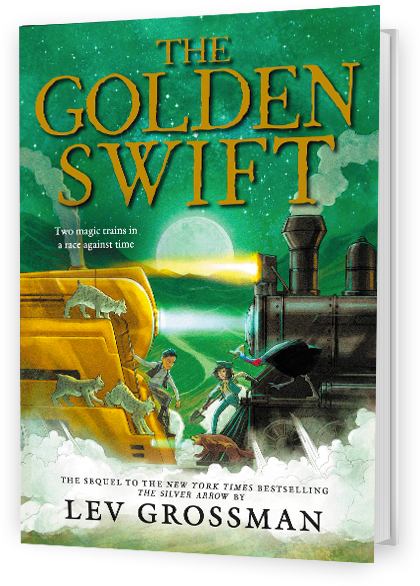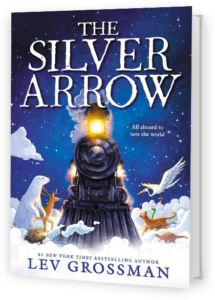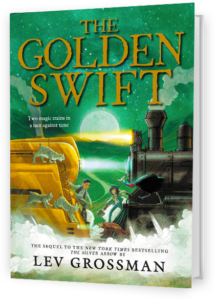The Way Things Are Done
THERE’S A WAY THINGS ARE DONE, AND THIS IS NOT IT.
I didn’t come up with it, Kate thought. I don’t even like their stupid way! But if they came up with it, they should stick to it.
Kate didn’t say any of this out loud—she often felt like she delivered her best speeches in her head, where they didn’t receive the popular acclaim they deserved. She was standing on a cold, rainy sidewalk in downtown Chicago in front of a skyscraper, one of those extremely tall and skinny and futuristic skyscrapers that are the native habitat of the common billionaire.
“Let’s go, Kate. He’s not here.” Her mother was wet and exasperated and generally over it all. “Typical Herbert!”
Kate couldn’t really disagree on either point. This was definitely Uncle Herbert’s address, but the man at the front desk equally definitely said he’d never heard of him. If Uncle Herbert was here, then it wasn’t in any visible or otherwise detectable form.
And also it really was typical Uncle Herbert.
Kate had only just met her uncle for the first time last year, and on the whole it had been a pretty good year since then. On her eleventh birthday, which had ended up lasting for several weeks, Herbert—who was in fact a billionaire—and also it turned out a wizard—had given Kate a steam train called the Silver Arrow. The Silver Arrow was a magic train that had a candy car, and a library car, and an unbelievably cozy sleeper car. It was part of a vast invisible worldwide train service dedicated to helping animals in need, which there seemed to be more and more of lately.
Oh, and the animals could talk. And the Silver Arrow could talk, too. This whole story was so flagrantly implausible that Kate had already resigned herself to never telling it to anybody; she guessed she could file it away with all those great speeches she made in her head that nobody would ever hear. At the end of their first trip, Kate and her younger brother, Tom, were made official conductors of the Great Secret Intercontinental Railway.
But it wasn’t one of those adventures that happens once and then you have to remember and savor and treasure it for the rest of your otherwise uneventful life. Since her birthday, Kate and Tom had gone on about a dozen trips on the Silver Arrow. At first she’d tried to keep a journal of them, but that had lasted about a trip and a half before she got lazy about it, and then some rabbits ate it, so that was that. She guessed she just wasn’t a journal-keeping person. But she’d helped hundreds of animals get where they needed to go, or get away from whatever they needed to get away from, or find whomever or whatever they were looking for. She’d ridden the Silver Arrow down deep tunnels, across luminous blue glacier crevasses, past secret vine-covered temples deep in sweltering equatorial rain forests.
It was everything she’d always been looking for without even knowing she was looking for it. Kate had always thought of herself as the kind of person who would one day lead a secret double life, and she’d figured her second life would probably be something in the superhero or espionage line, rather than the secret-invisible-train-conductor line. But she couldn’t have been happier with how things had turned out.
Or not literally. She could actually have been a little bit happier. Kate wasn’t complaining—it had been drummed into her in Social and Emotional Learning class that complaining was not a productive way to deal with personal challenges, and she figured her Social and Emotional Learning teacher had probably had her share of personal challenges since her name was Ms. Tinkler.
But if Kate were going to complain, just hypothetically, her complaints would have been as follows. There were five of them.
Complaint number one: Leading a double life was nowhere near as easy as it looked. Before all this happened she hadn’t even been that good at leading one life, and now that she had two they had a way of getting tangled up with each other. Problems from one life had a way of following you into the other one and vice versa. For example, Kate was always worrying about a social studies quiz when she should’ve been rescuing a sugar glider from a bushfire in Australia, and then in class when she was trying to remember the cause of the French Revolution (it was poverty), her brain would suddenly choose to worry about how chimney swifts were running out of chimneys to build their nests in.
And what was even the point of leading a double life if you couldn’t use one to run away from the other?
Complaint number two: Tom. Unbelievably, Tom had been showing signs of not being quite as interested in the Silver Arrow as he used to be. In fact he’d skipped the last couple of trips, which she found completely unacceptable on any number of levels. Kate would never dream of missing a chance to ride the Silver Arrow!
But Tom was nine now and big for his age, and he was getting really, really into hapkido, to the point where he’d been saying he didn’t have time for the Silver Arrow. Which Kate pointed out made no sense, because magical trips on the Silver Arrow took no time at all. But then he just said he was “tired,” and what could you say to that?
Admittedly, he was getting pretty good at hapkido. Tom was an upper blue belt now, and they were letting him use the nunchucks, and not just to fool around with but to actually hit people. And they hurt, as she found out when he hit her with one, which, yes, she had invited him to do, but only because she’d always thought they were just toys! Regardless: Kate couldn’t understand what he could possibly be getting out of hapkido that would be more important than the Silver Arrow. And she hated that. And she hated not being able to understand her own brother.
Complaint three was that she lost out on the part she wanted in the school musical, namely beguiling young heiress Hope Harcourt in Anything Goes. She got put in the chorus instead. And she couldn’t quit now because she’d look like a sore loser. And she was a sore loser! But she didn’t want to look like one.
That had nothing to do with the Silver Arrow, but she was still annoyed about it, so she put it on the list.
Four was that as hard as she worked on the Silver Arrow, as many animals as she helped, as hard as she tried, it was never, ever enough. There were always more animals in trouble. Kate read a lot, and in her experience stories with magic in them usually ended up with the world being saved at the end. But this was different. Kate tried and tried, and was brave, and never gave up, and generally acted like a hero, and still the world wasn’t saved.
She’d developed an unhealthy obsession with the bushfires that were raging in Australia, and she kept scanning news stories for the names of more and more obscure, irreplaceable little animals that were now being threatened with extinction—not just koalas and wallabies but numbats, and quokkas, and dunnarts. She’d never even heard of a dunnart, which was apparently some kind of tiny furry marsupial that looked exactly like a mouse, and of which there were no fewer than nineteen species, from the slender-tailed dunnart to the lesser hairy-footed dunnart. And now they were going extinct!
She felt so hopeless. When she went on her first mission on the Silver Arrow she thought she might actually make things better and bring some balance back to the world, but things had only gotten worse and worse. Adults—her parents, her teachers, the president—always talked about how concerned they were about the environment, what a terribly urgent crisis it was, but none of them ever seemed to do anything about it, and meanwhile every time Kate saw something in the news about ice caps melting or rain forests being cut down or bees disappearing, she thought of her friends, like the white-bellied heron, and the fishing cat, and the polar bear, and she had to leave the room so no one would ask her why she was crying.
And finally, complaint number five was that she couldn’t even go out on the Silver Arrow anymore because Uncle Herbert had disappeared! He was the one who gave Kate her missions. That was how things were done. But she hadn’t seen him for two months, and no one—not Tom, not their parents, not the Silver Arrow, not the porcupine who lived in the woods behind her house—had any idea what had happened to him.
Which meant that it was up to Kate to find him. She would’ve preferred to spend this particular rainy weekend curled up indoors with a book, or making origami boxes out of fancy paper, or drawing exotic flowers from photos she found on the internet, instead of traipsing—traipsing!—around Chicago in the freezing rain in search of her feckless billionaire uncle.
But no one else was going to do it, so it was up to Kate to solve the problem. Because that, all too often, was the way things were done.





